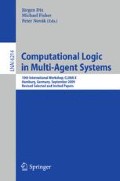Abstract
No intelligent decision support system functions even remotely without knowing the preferences of the user. A major problem is that the way average users think about and formulate their preferences does not match the utility-based quantitative frameworks currently used in decision support systems. For the average user qualitative models are a better fit. This paper presents an argumentation-based framework for the modelling of, and automated reasoning about multi-issue preferences of a qualitative nature. The framework presents preferences according to the lexicographic ordering that is well-understood by humans. The main contribution of the paper is that it shows how to reason about preferences when only incomplete information is available. An adequate strategy is proposed that allows reasoning with incomplete information and it is shown how to incorporate this strategy into the argumentation-based framework for modelling preferences.
Access this chapter
Tax calculation will be finalised at checkout
Purchases are for personal use only
Preview
Unable to display preview. Download preview PDF.
References
Amgoud, L., Maudet, N., Parsons, S.: Modelling dialogues using argumentation. In: Proc. ICMAS (2000)
Bench-Capon, T.J.M., Dunne, P.E.: Argumentation in artificial intelligence. Artificial Intelligence 171, 619–641 (2007)
Boutilier, C.: Toward a logic for qualitative decision theory. In: Proc. KR, pp. 75–86 (1994)
Boutilier, C., Brafman, R.I., Domshlak, C., Hoos, H.H., Poole, D.: CP-nets: A tool for representing and reasoning with conditional ceteris paribus preference statements. Journal of Artificial Intelligence Research 21, 135–191 (2004)
Brewka, G.: A rank based description language for qualitative preferences. In: Proc. ECAI (2004)
Brewka, G., Benferhat, S., Le Berre, D.: Qualitative choice logic. Artificial Intelligence 157(1-2), 203–237 (2004)
Coste-Marquis, S., Lang, J., Liberatore, P., Marquis, P.: Expressive power and succinctness of propositional languages for preference representation. In: Proc. KR, pp. 203–212 (2004)
Doyle, J., Thomason, R.H.: Background to qualitative decision theory. AI Magazine 20(2), 55–68 (1999)
Dubois, D., Prade, H.: Possibility theory as a basis for qualitative decision theory. In: Proc. IJCAI (1995)
Dung, P.M.: On the acceptability of arguments and its fundamental role in nonmonotonic reasoning, logic programming and n-person games. Artificial Intelligence 77, 321–357 (1995)
Kaci, S., van der Torre, L.: Preference-based argumentation: Arguments supporting multiple values. Int. J. of Approximate Reasoning 48, 730–751 (2008)
Keeney, R.L., Raiffa, H.: Decisions with multiple objectives: preferences and value trade-offs. Cambridge University Press, Cambridge (1993)
Liu, F.: Changing for the Better: Preference Dynamics and Agent Diversity. PhD thesis, Universiteit van Amsterdam (2008)
Prakken, H.: A study of accrual of arguments, with applications to evidential reasoning. In: Proc. ICAIL, pp. 85–94 (2005)
Prakken, H., Sartor, G.: Argument-based extended logic programming with defeasible priorities. Journal of Applied Non-Classical Logics 7, 25–75 (1997)
Rahwan, I., Ramchurn, S.D., Jennings, N.R., McBurney, P., Parsons, S., Sonenberg, L.: Argumentation-based negotiation. Knowledge Engineering Review 18(4), 343–375 (2004)
Author information
Authors and Affiliations
Editor information
Editors and Affiliations
Rights and permissions
Copyright information
© 2010 Springer-Verlag Berlin Heidelberg
About this paper
Cite this paper
Visser, W., Hindriks, K.V., Jonker, C.M. (2010). Argumentation-Based Preference Modelling with Incomplete Information. In: Dix, J., Fisher, M., Novák, P. (eds) Computational Logic in Multi-Agent Systems. CLIMA 2009. Lecture Notes in Computer Science(), vol 6214. Springer, Berlin, Heidelberg. https://doi.org/10.1007/978-3-642-16867-3_8
Download citation
DOI: https://doi.org/10.1007/978-3-642-16867-3_8
Publisher Name: Springer, Berlin, Heidelberg
Print ISBN: 978-3-642-16866-6
Online ISBN: 978-3-642-16867-3
eBook Packages: Computer ScienceComputer Science (R0)

